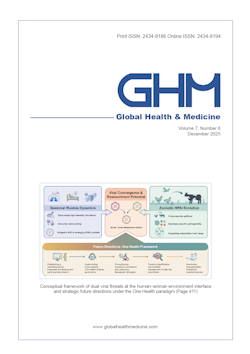Global Health & Medicine 2022;4(4):204-209.
Evaluation of the representativeness of data in the COVID-19 Registry Japan during the first six waves of the epidemic
Hayakawa K, Asai Y, Matsunaga N, Tsuzuki S, Terada M, Suzuki S, Kitajima K, Saito S, Ohmagari N
The COVID-19 Registry Japan (COVIREGI-JP), a registry of patients hospitalized with coronavirus disease (COVID-19), contains the largest national COVID-19 inpatient population. Since COVIREGI-JP invites voluntary participation by facilities, selection bias is inevitable. The current study examined the representativeness of COVIREGI-JP data in comparison to open-source national data. The number of infections and deaths among hospitalized COVID-19 patients in COVIREGI-JP were compared to those in national data recorded during the six waves of the COVID-19 epidemic until March 6, 2022. During the period studied, patients in COVIREGI-JP represented 1% of the total COVID-19 cases according to national data; the proportion was high during the first wave (32.7%) and tended to decrease, especially after the fourth wave. The overall proportion of patients from each region varied from 0.8% to 2.5%, but case fatality rates in COVIREGI-JP tended to be higher than those in the national data, with the exception of a few waves, in several regions. The difference was smallest during the first wave. Although COVIREGI-JP consistently registered cases from all regions of the country, the proportion tended to decline after the beginning of the epidemic. Given the epidemiological persistence and the ever-changing epidemiology of COVID-19, continued case registration and data utilization in COVIREGI-JP is desirable, although selection bias in COVIREGI-JP registration of cases should be carefully interpreted.
DOI: 10.35772/ghm.2022.01033







